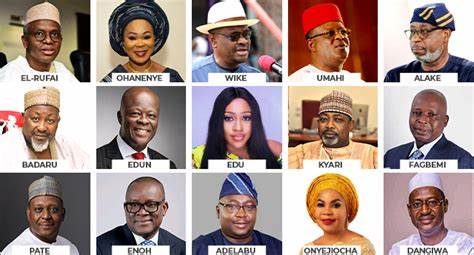Bloated cabinet threat to good governance
The federal government is clearly working in contradictions, a development which needs to be resolved urgently. In one breadth, it is striving hard to convince Nigerians to brace up for lean times brought about by its fiscal squeeze. Yet in another, it is assembling a bloated cabinet, with all the obvious cost implications for the […]

Tinubu’s Ministerial Nominees
The federal government is clearly working in contradictions, a development which needs to be resolved urgently. In one breadth, it is striving hard to convince Nigerians to brace up for lean times brought about by its fiscal squeeze. Yet in another, it is assembling a bloated cabinet, with all the obvious cost implications for the nation’s coffers.
As part of the process of forming his cabinet, President Bola Tinubu sent the first batch of 28 ministerial nominees to the Senate for confirmation. He later followed that up with a second set, giving a total of 48 names.
These 48 men and women have been screened by the upper chamber of the National Assembly, with 45 cleared. Three are said to be waiting for security clearance. These are in addition to about 20 special advisers of different nomenclatures, for whose appointments the tresident had previously sought and received approval from the Senate. Thus, on the whole, we now have a cabinet close to 70.
This is the highest number of cabinet members to serve in any administration since Nigeria’s return to civilian rule in 1999, based on available figures. It is on record that President Olusegun Obasanjo ran the government with 27 ministers during his first term from 1999 to 2003. In his second term, he raised this marginally to 30. President Umaru Musa Yar’Adua in his quest to ensure that all the 36 states and the FCT were represented in the cabinet, raised the number to 39, with the introduction of the post of Minister of State.
- Capstone partners Lagos school to raise awareness on domestic violence
- ‘TRCN to create teachers’ professional dev’t platform’
On his part, President Goodluck Jonathan ruled with a leaner cabinet, reducing the size to 33 initially, but later raising it to 37. The current number is still larger than that of the immediate past President, Muhammadu Buhari, who raised the figure to 42.
Firstly, we call for an amendment to the section of the constitution which stipulates that every state must produce a minister. There is really no need for that. All Nigeria needs is a group of persons who are to do the work well irrespective of where they hail from; and they do not have to be so many.
Also, viewed against the current economic and social realities prevalent in the country, this huge figure is quite an aberration. It is at variance with the pronouncements of Mr President who promised to cut costs and fight wastage in government. It also runs contrary to the call by the nation’s number one citizen, who only a few days ago called on the citizens to endure the harsh conditions of living unleashed on them by the removal of petrol subsidy.
We had high hopes that Tinubu’s vows would bring sanity to the process of governance, but what we are witnessing from his bulging list of ministerial nominees does not seem to support this.
The principal reason given by the government for the removal of the petrol subsidy was that it had become a drain on the public purse which could no longer be accommodated. It is, therefore, a surprise to Nigerians, especially the downtrodden who are currently being weighed down by the high cost of living, to see the same government engage in what is obviously an unnecessary bloating of the cost of government through a large cabinet.
Each of the ministers and advisers will have their retinue or paraphernalia of aides and special assistants, who in turn will have their own assistants. In a country where appointment into government establishment is not hinged on a needs basis but on other reasons, it is the Nigerian people who will be short-changed.
Not long ago, Daily Trust had reason to write an editorial on the issue of the high cost of running the government in Nigeria, but nothing has been done to change the tide. From available records, it is evident that the cost of running the government in the country is an obstacle to the real purpose of government itself, which is delivering service to the people. This is because Nigeria has, unfortunately, become an example of a country where the remuneration of political appointees leaves little for the provision of basic needs for the masses.
Comparing the current number with what obtains in some other jurisdictions puts Nigeria’s case in clear perspective. The United Kingdom (UK) has 22 ministers. In Ghana, there are about 30 cabinet ministers, There are regional ministers who are the equivalent of Nigeria’s state governors. In Japan, the government is run by about 20 ministers.
Why must Nigeria’s cabinet be so large? Has any administration actually bothered to determine the optimum number of ministers needed to run the economy effectively?
By the way, what determines the number of ministers that should serve in a cabinet? Is it the volume of work to be done? If it is, then what determines the volume of work to be done under a given dispensation or administration? Is it the size of problems facing the nation at any given point in time?
Until reasonable answers are given to the above questions, the current size of the proposed cabinet remains unjustified. Also, states across the country must work towards cutting cost of governance. Only then can Nigeria prosper.
